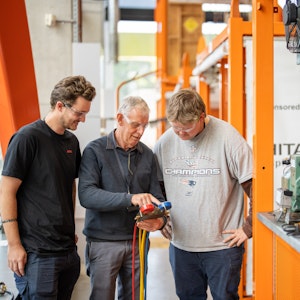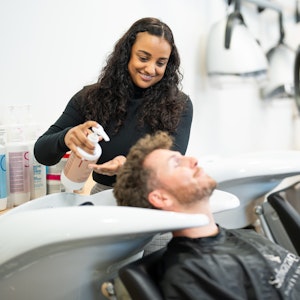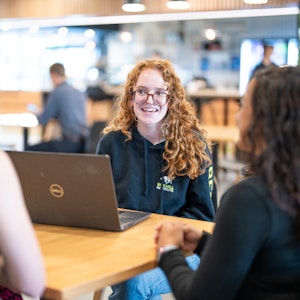About the course
About the course
Our fashion design course provides you with the skills you need to create innovative designs, either for the catwalks of high couture or ready-to-wear garments. You will gain the skills and knowledge to work as a fashion designer and understand all aspects of the industry. You'll conceptualise your design, develop your drawing skills, and learn about texture, colour and fabric, pattern making and garment construction as you work towards turning raw materials into a unique, finished product.
You'll study fashion history, cultural and social attitudes to fashion, and trends that have influenced our industry today.
The course will also develop your strong communication and interpersonal skills to share your vision, whilst training you in the finance, sales and marketing side (including digital marketing and event management).
You'll have access to industry standard software programs including 3D design, CAD illustration, Adobe and WGSN, which will help you apply your new skills in a practical setting through an internship opportunity with an Australian fashion organisation.
This course will allow you to work alongside our supportive teachers in our brand new design hub with mentors, creatives and designers. You'll also be able to showcase your collection in your final year in our fashion parade where parents, teachers, industry and VIPs will celebrate your achievements.
Once you have completed our fashion course, you'll have the opportunity to apply for our resident program within the design hub and become one of our emerging designers.
Course Details
- Intake Dates & Course Length
- Career & Learning Outcomes
- Entry Requirements
- Applying
- Pathways & Accreditation
- Fees & Finance Options
- Course Structure
- Admissions Data & Indicative Enrolments
Last updated:
Fri, 03 May 2024 04:00:30 GMT
Box Hill Institute reserves the right to alter or delete details of a course offering, fees or other information provided
Career & Learning Outcomes
- Fashion Designer
- Product Developer
- Trend Forecaster
- Production Technical Support
On completion of this course, you will be able to:
- competently demonstrate a broad understanding of the design industry, and use professional skills and knowledge to solve complex design problems
- apply their skills and knowledge in a professionally ethical and responsible manner, and communicate effectively with other design professionals and the wider global design community, as an individual and in a team
- develop design thinking solutions to complex problems appropriate to the social, ethical, environmental and corporate social responsibility contexts in which they are applied
- engage in the process of continuing and further learning, needed to retain the necessary level of professional skills and knowledge in the area of design
Entry Requirements
Applicants with higher education study
Applicants with higher education are those who have completed some or all of a higher education course as their highest level of study since leaving secondary education. This includes study undertaken by applicants at either non-university higher education providers or university some time ago or recently, such as applicants seeking to transfer to Box Hill Institute from another education provider or applicants changing to a different course at Box Hill Institute.
Applicants with higher education study will be required to attend an interview with a folio. Applicants may receive subject credit on the basis of higher education studies.
Interview: applicants will be asked a series of questions relating to their suitability for the course. Applicants are expected to demonstrate a clear understanding and aptitude for the course.
Folio requirements: applicants are required to present a portfolio of 8 electronic images. Applicants can present a folio that demonstrates creativity, artwork, fashion illustrations and concept development.
Applicants with vocational education and training (VET) study
Applicants with VET study are those who have completed some or all of a VET course as their highest level of study since leaving secondary education. This includes study at a public TAFE or other VET provider and applicants who have other qualifications such as Year 10 or Year 12 secondary school certificate. If you have completed an Advanced Diploma of Fashion or associate degree, you are eligible for advanced standing for up to 18 months.Applicants with VET study will be required to attend an interview with a folio. Applicants may receive subject credit on the basis of your diploma studies.
Interview – applicants will be asked a series of questions relating to their suitability for the course. Applicants are expected to demonstrate a clear understanding and aptitude for this course.
Folio requirements – applicants are required to present a portfolio of 8 electronic images.. Applicants can present a folio which demonstrates creativity, artwork, fashion illustrations and concept development.
Applicants with work and life experience
Applicants with work and life experience have left secondary education more than two years ago (i.e. applicants who are not classified as recent secondary education applicants) and have not undertaken VET or higher education study since then.
‘Experience’ could include a combination of factors sufficient to demonstrate readiness for higher education. This includes mature age entry, professional experience, community involvement or work experience. Applicants may have undertaken non-formal programs that have helped them to prepare for tertiary education or are relevant to the proposed higher education field of study.
Applicants with work and life experience will be required to attend an interview with a folio.
Interview – applicants will be asked a series of questions relating to their suitability for the course. Applicants are expected to demonstrate a clear understanding and aptitude for this course.
Folio requirements –applicants are required to present a portfolio of 8 electronic images. Applicants can present a folio which demonstrates creativity, artwork, fashion illustrations and concept development.
Applicants with recent secondary education
Applicants with recent secondary education are those whose admission is based primarily on completion of Year 12 undertaken at school, TAFE or other VET or higher education provider (this includes both Australian or overseas equivalent) that was completed (or will be) in the current year or within the previous two years.
Year 12 Applicants must have successfully completed VCE (or equivalent) with a study score of at least 20 in English. Additional consideration will be given for achievement for applicants who have completed at least one of the following VCE subjects: Design and Technology, Studio Arts, Visual Communication and Design.
Applicants with recent secondary education will be required to attend an interview with a folio.
Interview – applicants will be asked a series of questions relating to their suitability for the course. Applicants are expected to demonstrate a clear understanding and aptitude for this course.
Folio requirements – applicants are required to present a portfolio of 8 electronic images. Applicants can present a folio which demonstrates creativity, artwork, fashion illustrations and concept development.
Applying
VTAC application and direct entry available
Applicants completing secondary education (Year 12) or equivalent must:
- Complete a VTAC application
- Book an interview
All other applicants must:
- Book an interview
Recognition of Prior Learning is available.
Pathways & Accreditation
After successful completion, you may wish to apply for entry into further postgraduate study, such as a Master of Design.
This course is accredited by the Tertiary Education Quality and Standards Agency (TEQSA) and the qualification is aligned with the Australian Qualification Framework (AQF) level 7 and Box Hill Institute Graduate Attributes.
Fees & Finance Options
| Full Fee | |
| Tuition Fee | $55,872 |
| Service & Amenity Fee | $828 |
| Material Fee | $0 |
| Retain Course Items | $0 |
| Total Course Estimate | $56,700 |
| Payable Estimate (at commencement) | $18,892 |
Service & Amenity Fee may vary depending on course commencement and enrolment duration. Retain Course Items are purchased once by the student prior to commencing. Those items then become the property of the student. Fees listed are at 2024 rates and may increase annually over the duration of delivery. The student tuition fees listed are subject to change given individual circumstances at enrolment. For more information please contact our Course Advisors on 1300 BOX HILL.
Course Structure
You will study 28 units including:
- 12 core units
- 14 major units
- 2 elective units
- DES101Creative Design Process6.0 points
39.0 hoursThis subject provides an introduction to the creative design process. Students will learn the strategies, processes, techniques, and design methodologies required to be an adaptive, multidisciplinary designer.
Approaches to the study of design in this unit will equip students with a range of conceptual viewpoints using visual research techniques. The elements and principles of design and design thinking concepts will be explored.
Students will produce a creative folio in response to a design brief. This approach is intended to encourage individuals to start to construct a personally meaningful overview of design, and begin to form knowledge of the creative process through research and interaction.
6.0 credit points
39 hours/semester (3x13weeks)
Subject contact hours (3hr per week): 1 hour lecture and 2 hour tutorial
Prerequisites: Nil
Corequisites: Nil
Assessment: Assessment 1: Folio and Written Assignment. (30%) Assessment 2: Creative Design Folio and Research Journal. (50%). Assessment 3: Individual Presentation of a Creative Design Folio. ( 20%) - DES102Collaborative Communication6.0 points
39.0 hoursThis subject explores how to work in a multi-disciplinary team to develop professional and interpersonal communication skills within a contemporary work environment. Students will examine the skills required for effective communication - written and oral, investigate team dynamics and collaboration, conflict resolution strategies, project management, diversity, and cross-cultural communication. Students will also learn academic skills appropriate for higher education study.
6.0 points
39 hours/semester (3x13weeks)
Subject Contact hours (3hr per week): 1 hour lecture and 2 hour tutorial
Prerequisites: Nil
Corequisites: Nil
Assessment: Assessment 1: Individual Creative Challenge/problem based project. (30%). Assessment 2: Group project (40%) Assessment 3: Individual Essay (30%) - DES103Digital Cad Principles6.0 points
39.0 hoursThis subject provides an introduction to the Adobe Creative Cloud suite of software programs and provides an opportunity to demonstrate through the use of this software, innovative concept development, creative and experimental design solutions, and professional presentation skills. This unit underpins the foundations of design while using CAD (Computer Aided Design) to explore and present. Skills and knowledge acquired in this unit will enable learners to share their design concepts in the digital visual format and build on their knowledge regarding the creative process.
6.0 points
39 hours/semester (3x13weeks)
Subject Contact hours (3hr per week): 1 hour lecture and 2 hour tutorial
Prerequisites: Nil
Corequisites: Nil
Assessment: Assessment 1: Individual Written research proposal (30%) Assessment 2: Individual CAD Drawing Portfolio ( 50%). Assessment 3: Individual Presentation and reflection ( 20%) - DES110Sustainable Design Practice6.0 points
39.0 hoursThis subject will explore the design process from a sustainable perspective introducing key social, environmental and economic issues underpinning sustainable innovation in the fashion and design industry. Students will be introduced to professional ethics, corporate social responsibility, and environmental impacts of design, manufacturing and production processes. They will investigate current industry practices and compare linear versus circular design principles and strategies as a framework for emerging alternatives for future fashion and product design practice.
6.0 points
39 hours/semester (3x13weeks)
Subject Contact hours (3hr per week): 1 hour lecture and 2 hour tutorial
Prerequisites: Nil
Corequisites: Nil
Assessment: Assessment 1: Circular Design Case Study Project (30%) Assessment 2: Identify and review a product range based on circular/sustainable principles and practices (30%) Assessment 3: Sustainable Design Folio and presentation (40%) - DES111Introduction To Digital Marketing6.0 points
39.0 hoursThis subject explores the concept of digital marketing, technologies and how digital communities are impacted and enhanced by the use of technology. Students will examine how marketers use a range of digital marketing strategies and technologies to promote, market, and engage with customers to boost brand engagement and customer loyalty. Key topics will include marketing mix elements (product, price, place, and promotion), online communities and their creation using social media platforms and tools, storytelling techniques, creative content, online campaigning and advertising.
6.0 points
39 hours/semester (3x13weeks)
Subject Contact hours: (3hr per week): 1 hour lecture and 2 hour tutorial
Prerequisites: Nil
Corequisites: Nil
Assessment: Assessment 1: Individual Case Study (30%) Assessment 2: Group Market Research Report (30%) Assessment 3: Group Report and presentation(40%) - DES112Digital Product Design6.0 points
39.0 hoursThis subject will allow students to build on their knowledge of digital product design and consolidate and extend the skills and knowledge attained in DES103 Digital CAD Principles, to visually communicate design concepts using digital technologies.
Students will digitally create, manipulate and prototype visual design ideas which they will test, iterate and synthesise into viable concepts.
6.0 points
39 hours (3x13weeks)
Subject Contact hours (3hr per week): 1 hour lecture and 2 hour tutorial
Prerequisites: DES103 Digital CAD Principles.
Corequisites: Nil
Assessment: Assessment 1: Group Trend Research Report (20%) Assessment 2: Individual Product Proposal (50%) Assessment 3: Individual Presentation of Folio(30%) - DES202Advanced Digital Product Design6.0 points
39.0 hoursThis subject will further develop student’s skills and knowledge in computer-aided design (CAD), as they use industry specific software with a focus on technical trade sketching applicable to a fashion range. Students will be engaged in more complex learning activities that will deepen their knowledge and skills in using industry software programs as used in the fashion environment. Further terminology pertaining to apparel and visual assortment plans will be introduced, including range plans, silhouettes, materials, product design and construction details.
6.0 points
39 hours/semester (3x13weeks)
Subject Contact hours (3hr per week): 1 hour lecture and 2 hour tutorial
Prerequisites: DES103 – Digital CAD Principles & DES112 – Digital Product Design.
Corequisites: Nil
Assessment: Assessment 1: Individual Skills Test(30%). Assessment 2: Individual CAD Technical Folio (30%) Assessment 3: Individual CAD Design folio (40%) - DES210Your Career3.0 points
26.0 hoursThis subject provides students with the required knowledge and skills to develop a comprehensive career strategy to successfully navigate their future career pathway. Topics covered will include management theories, workplace cultures, collaboration, negotiation and working in teams, as well as the student undertaking reflective and thought provoking exercises relating to ethics, values, communication and leadership styles. Knowledge of emotional intelligence will assist students to identify their own abilities, personal attributes and employability skills to assist with their career planning.
3.0 points
26 hours/semester (2x13weeks)
Subject Contact hours (2hr per week): 2 hour tutorial
Prerequisites: Nil
Corequisites: Nil
Assessment: Assessment 1: Career Folio (Individual)( 40%) Assessment 2: (A)Interview Preparation (Individual) (30%) (B) Participate in a mock interview for that position (30%) - DES301Immersive Professional Practice 16.0 points
39.0 hoursThis subject is to create a strong foundation to further expand students’ knowledge of working in teams to research, develop and respond to a solution for an industry project brief. Students will work collectively in a group, developing a relevant solution in response to a live industry brief.
Content covered will include effective business decision-making, project management, critical analysis, and problem-solving progressing to presenting a proposal to an industry client. Industry peers will play a role in final project proposal presentation, providing the student with opportunities to critically reflect on their own professional practice.
6.0 points
39 hours/semester (3x13weeks)
Subject Contact hours (3hr per week): 1 hour lecture and 2 hour tutorial
Prerequisites: Nil
Corequisites: Nil
Assessment: Assessment 1: Group Project Plan (30%) Assessment 2: Group Project (40%) Assessment 3: Individual Reflective Report (30%) - DES302Project Innovation6.0 points
39.0 hoursThis subject provides the students the opportunity to put into practice their learning from the course and apply their knowledge and skills to a project involving emerging and potential future technological developments in the design and fashion industries. Particular emphasis is on ethical and sustainability implications and considerations. The unit provides opportunities for students to build on their capabilities attained during the course and allows application to the design, development and presentation of a team-based solution to a complex business or social problem.
Students work collaboratively as a team to execute a structured project that integrates design thinking principles and results in a meaningful outcome that is presented to an industry partner or stakeholder panel. An emphasis is placed on building team skills and project management acumen.
6.0 points
39 hours/ semester (3x13weeks)
Subject Contact hours (3hr per week): 1 hour lecture and 2 hour tutorial
Prerequisites: Nil
Corequisites: Nil
Assessment: Assessment 1: (Group) Collaborative Industry Project Plan (40%) Assessment 2: a)Process Journal (30%). b). Presentation on the Projects Innovative Solution (10%). Assessment 3: Individual Reflection ( 20%) - DES307Immersive Professional Practice 26.0 points
89.0 hoursThis subject provides students with a Work Integrated Learning (WIL) experience in the design industry. Students have the opportunity to actively apply the theories and concepts learned throughout the course to provide design solutions in real world settings. Through action learning and reflective practice, students’ will consolidate their learning in their chosen field (major), and develop their professional and personal skills.
The unit will also provide students with the opportunity to observe industry practitioners within the design industry and identify opportunities for their own career paths. Students will engage using work-ready skills and knowledge and reflect on how these are applied when navigating the workplace through observation, analysis and critical evaluation to refine their future career goals and direction. Students will be supervised by an industry.
6.0 points
9 hours /semester (3x3weeks)
Subject Contact hours (3hr per week): 1 hour lecture and 2 hour tutorial
80 hours (8 hoursx10weeks) at the workplace
Prerequisites: DES301 Immersive Professional Practice 1. and completion of all Year 1 and Year 2 units.
Corequisites: Nil
Assessment: Assessment 1: Individual Work Integrated Learning (WIL) Project Proposal(30%) Assessment 2: Individual Final WIL Project Report and Presentation (50%) Assessment 3: a)Industry and Academic Supervisors Report b)Self-reflection (20%) - DES308Special Event Management6.0 points
39.0 hoursThis subject is designed to provide detailed knowledge and practice of the planning and management of industry events, such as product launches, exhibitions, runway shows, workshops and digital showcases.
Students will study event management processes and a broad range of event-related skills, including how to work independently to make operational event management decisions and collaborating to execute a special event as a team. Key topics include strategic event planning, operational and creative elements, budgets, risk management, event marketing, sponsorship and fundraising, and event evaluation. This will culminate in a major project that will require students to work collaboratively to plan, execute and critically evaluate a special event.
6.0 points
39 hours/ semester (3x13weeks)
Subject Contact hours (3hr per week): 1 hour lecture and 2 hour tutorial
Prerequisites: Nil
Corequisites: Nil
Assessment: Assessment 1: Individual Critical Analysis of an existing event. (40%) Assessment 2: Group Project (40%). Assessment 3: Individual Critical reflection and presentation (20%) - DES104Studio Fundamentals 13.0 points
26.0 hoursThis subject will introduce students to studio practice and the fundamental knowledge of patternmaking, the body, form and fit as a means to realising and executing solutions to design concepts. Students will be introduced to the core principles of 2D patternmaking, working with pattern blocks and industry standards applied to commercial manufacturing of fashion garments. This unit will contribute to the formation of a conceptual framework within which decisions are made regarding choice of materials referenced to design, pattern, fit, production and end-use criteria.
3.0 points
26 hours/ semester (2x13weeks)
Subject Contact hours (2hr per week): 1 hour lecture and 1 hour tutorial
Prerequisites: Nil
Corequisites: Nil
Assessment: Assessment 1: Individual Technical Patternmaking Folio (60%) Assessment 2: Group Presentation: Evaluation of Toile (40%) - DES105Studio Fundamentals 23.0 points
26.0 hoursThis subject introduces students to studio practice focusing on the fundamental knowledge and practical skills required for garment construction and apparel production processes. These processes will include specifications, construction sequence plans and cutting layouts. Fabrics and fibres will be investigated including their application to garment designs. Students will also undertake garment analysis and develop effective communication strategies for the construction of garments for commercial production. This unit will incorporate hands on garment construction, cutting and finishing techniques for a range of prototypes using a range of industrial sewing machines.
3.0 points
26 hours/semester (2x13weeks)
Subject Contact hours (2hr per week): 1 hour lecture and 1 hour tutorial
Prerequisites: Nil
Corequisites: Nil
Assessment: Assessment 1: Individual Fiber and Fabric Folio. (40%) Assessment 2: Individual Garment Construction including production documentation (60%) - DES113Studio Fundamentals 33.0 points
26.0 hoursBuilding on Studio Fundamentals 1 and Studio Fundamentals 2, students will extend and consolidate their knowledge and understanding of patternmaking used in fashion design and manufacturing. This unit will investigate more complex and experimental techniques to resolve creative design concepts. The relationship between the flat pattern, the human form and fit will be developed further by introducing basic draping techniques.
3.0 points
26 hours/semester (2x13weeks)
Subject Contact hours (per week): 1 hour lecture and 1 hour tutorial
Prerequisites: DES104 Studio Fundamentals 1 and DES105 Studio Fundamentals 2.
Corequisites: Nil
Assessment: Assessment 1: Individual Technical Folio- (50%) Assessment 2: Individual Modified Patternmaking and draping techniques Folio (50%) - DES114Studio Fundamentals 43.0 points
26.0 hoursBuilding on skills and knowledge gained in Studio Fundamentals 1 and 2, students will continue to develop their interpretation of design and ideas into garments and extend their knowledge of the constraints that materials place on design concepts and construction. Knowledge of sustainable fabrications and production processes including sourcing components, garment costing and sustainable garment manufacturing will be introduced. Through the construction of experimental toiles, students will experience garment production processes.
3.0 points
26 hours/ semester (2x13weeks)
Subject Contact hours 2hr per week): 1 hour lecture and 1 hour tutorial
Prerequisites: DES104 Studio Fundamentals 1 and DES105 Studio Fundamentals 2.
Assessment: Assessment 1: Group Report (40%) Assessment 2: (1) Folio of garment toiles (2) Garment Construction Sample. (3) Presentation of original garments (60%) - DES201Fashion Product Development3.0 points
26.0 hoursThis subject is an introduction to managing the product development process for a commercial fashion range either locally or offshore. The student will explore the concepts, processes and skills associated with planning and managing workflow from design concept to delivery, including the analytical and interpersonal skills required for solving quality control and production issues, technical pack development, garment costing and sourcing issues and decisions. Supply chain and project management concepts are investigated as frameworks for understanding fashion-specific critical path analysis. The student will gain a basic level of competence in the use of Enterprise Resource Planning (ERP) software and how it can be utilised to facilitate the product management process.
3.0 points
26 hours/ semester (2x13weeks)
Subject Contact hours (2hr per week): 1 hour lecture and 1 hour tutorial
Prerequisites: Nil
Corequisites: Nil
Assessment: Assessment 1: Group Case Report (40%) Assessment 2: Individual Technical File (60%) - DES203Design Studio Practice 16.0 points
39.0 hoursThis subject consolidates and further enhances fashion design and construction skills, knowledge, and techniques. The influence of social and cultural elements on fashion design is considered and evaluated to provide a broad and contemporary context. Using appropriate design software and machine and hand techniques, students will design and construct an individual range of suitably complex garments in response to a design brief. Garment materials and construction techniques will be selected in compliance with sustainable principles, and production details will be documented. The role of Quality Control in production is introduced and explored.
6.0 points
39 hours/semester (3x13weeks)
Subject Contact hours (3hr per week): 1 hour lecture and 2 hour tutorial
Prerequisites: DES113 Studio Fundamentals 3 and DES114 Studio Fundamentals 4
Corequisites: Nil
Assessment: Assessment 1: Group Report Social and Cultural influences on Fashion (20%) Assessment 2 (a) : Individual Design and construct an individual range (30%) Assessment 2 (b) : Individual Folio of experimental toiles and production document file (30%) Assessment 2(c:) Individual presentation of design and construction of the fashion range (20%) - DES204Tech Studio Practice 16.0 points
39.0 hoursThis subject will extend the students knowledge and skills of 2D and 3D patternmaking procedures and technologies in manual and computer-aided methods, which are examined and applied. The student will also be challenged to approach garment design using innovative methods of pattern cutting and exploratory draping techniques. The attributes of different patternmaking technologies and techniques will be analysed and reviewed through the construction of patterns for a range of complex garment types.
6.0 points
39 hours/ semester (3x13weeks)
Subject Contact hours (3hr per week): 1 hour lecture and 2 hour tutorial
Prerequisites: DES103 Digital CAD Principles; DES104 Studio Fundamentals 1 and DES113 Studio Fundamentals 3
Corequisites: Nil
Assessment: Assessment 1: Individual Technical pattern folio (40%) Assessment 2: Individual CAD technical pattern digital folio (30%) Assessment 3: Individual Reflective Piece (30%) - DES209Fashion Range Development6.0 points
39.0 hoursThis subject introduces the practice and related theory of fashion range planning. The student will acquire relevant knowledge and skills for using computer-aided design (CAD) to build visual range plans for a commercial fashion brand. Current examples of the range plans of leading fashion brands will be evaluated and critiqued as part of a broad market research and trend analysis, and forecasting project to identify a seasonal trend direction that both anchors and provides the inspiration for the development of an appropriate merchandise mix that meets the needs of a target market.
This subject will involve a collaborative project with industry professionals from an established fashion brand.
6.0 points
39 hours/ semester (3x13weeks)
Subject Contact hours (3hr per week): 1 hour lecture and 2 hour tutorial
Prerequisites: DES103 Digital CAD Principles and DES112 Digital Product Design
Corequisites: Nil
Assessment: Assessment 1: Group Market Research Analysis (Report) for an assortment plan (30%) Assessment 2: Individual Trend research report for a fashion range (30%) Assessment 3: Individual CAD folio and visual range plan (40%) - DES211Design Studio Practice 26.0 points
39.0 hoursThis subject explores the history of fashion to broaden and inform design viewpoints. The process of creating a unique capsule collection while developing tailoring skills and knowledge is undertaken whilst infusing sustainable design principles. A deeper understanding of complex technical and construction techniques related specifically to garment tailoring is explored and applied. Material selection and analysis for end-use application is performed and combined with design elements to ensure the tailored capsule collection is expressive of personal style and conforms to industry production standards.
6.0 points
39 hours/semester (3x13weeks)
Subject Contact hours (3hr per week): 1 hour lecture and 2 hour tutorial
Prerequisites: DES203 Design Studio Practice 1
Corequisites: Nil
Assessment: Assessment 1: Individual Design folio (20%) Assessment 2: Individual Folio of technical toiles (50%) Assessment 3: Individual Presentation and reflection of final range (30%) - DES212Tech Studio Practice 26.0 points
39.0 hoursThis subject will consolidate existing pattern-making capabilities and extend the skills and knowledge required for appropriate selection and application of patternmaking technologies that will meet the needs of a complex design brief. Students build on their knowledge of the functions, capabilities, and applications of various patternmaking methods, with a focus to translate design concepts for a unique, tailored capsule range into viable 2D and 3D patterns, selecting the most appropriate methods and techniques. Students will resolve design problems and issues through experimentation, modification, and iteration to produce a commercially viable tailored capsule range.
6.0 points
39 hours/semester (3x13weeks)
Subject Contact hours (3hr per week): 1 hour lecture and 2 hour tutorial
Prerequisites: DES204 Tech Studio Practice 1
Corequisites: Nil
Assessment: Assessment 1: Individual In-class CAD and CAD tech file/Pattern pack (30%) Assessment 2: Individual Manual patternmaking folio plus reflection (40%) .Assessment 3: Practical test of patternmaking skills (30%) - DES303Advanced Studio Practice 16.0 points
39.0 hoursStudents will consolidate their skills and knowledge acquired in earlier subjects to design and develop a showcase collection for the runway that reflects their unique design aesthetic using the latest technologies. Students are encouraged to explore their own professional ‘voice’ and creative vision as a designer; and roles within the broader fashion industry context are investigated. The development of the showcase collection will be underpinned by an appropriate theoretical framework, including market and conceptual research integrated with circular design thinking, technology and sustainable elements. An exploration of new, experimental, and innovative skills, techniques and technologies will inform and influence individual design practice.
6.0 points
39 hours/semester (3x13 weeks)
Subject Contact hours (3hr per week): 1 hour lecture and 2 hour tutorial
Prerequisites: Nil
Corequisites: Nil
Assessment: Assessment 1: Group Design Proposal (30%) Assessment 2: Individual Technical folio (30%) Assessment 3:Individual presentation and critical evaluation of individual’s final garments (40%) - DES304Contemporary Design Technologies 16.0 points
39.0 hoursUtilising 3D software for apparel design and development, students will create digital designs that include true-motion fit, pattern modification and grading. Students will critically review and resolve design and fit issues by creating and appraising virtual prototypes of design concepts in 3D design and enhance their appreciation of how these programs can optimise fashion supply chain elements. Applying 3D design technologies to help meet the sustainability goals and targets of fashion businesses is also critically analysed.
6.0 points
39 hours/semester (3x13 weeks)
Subject Contact hours (per week): 1 hour lecture and 2 hour tutorial
6.0 points
39 hours/semester (3 x 13 weeks)
Subject Contact hours (per week): 1x 1 hour lecture and 1x2 hour tutorial
Prerequisites: Nil
Corequisites: Nil
Assessment: Assessment 1: Group Research Assignment (30%) Assessment 2: Individual Design and prepare a folio (40%)Assessment 3: Individual presentation and evaluation of 3D prototype (30%) - DES309Advanced Studio Practice 26.0 points
39.0 hoursThis subject allows students to refine and critically reflect on their design practice through interaction with peers, lecturers, and industry professionals, underpinned by the knowledge and skills gained. Reflecting on theoretical frameworks, students will build on and enhance their previous work in Advanced Studio Practice 1, resulting in an informed and cohesive showcase collection. Students complete a professional presentation of their individual collection (including marketing material needed) and will have the opportunity to communicate and showcase their collection in an end-of-year fashion event presented to industry professionals.
6.0 points
39 hours/semester (3x13 weeks)
Subject Contact hours (3hr per week): 1 hour lecture and 2 hour tutorial
Prerequisites: DES303 Advanced Studio Practice 1
Corequisites: Nil
Assessment: Assessment 1: Group Integrated Marketing Plan (30%) Assessment 2: Individual Production and Presentation of Final Collection ( 50%) Assessment 3: Individual Design and Technical Folio (20%) - DES310Contemporary Design Technologies 26.0 points
39.0 hoursThis subject builds on students’ knowledge of 3D design principles and skills in range planning and digital design technologies gained in Contemporary Design Technologies 1, to develop a commercial fashion range. Students will have the opportunity to work in small teams to research a market opportunity and create a capsule range in 3D format for a fashion brand and present a 3D merchandise plan. Peer and industry review will provide students with opportunities to critically reflect on their professional design practice in this unit.
6.0 points
39 hours/semester (3x13weeks)
Subject Contact hours (3hr per week): 1 hour lecture and 2 hour tutorial
Prerequisites: DES304 Contemporary Design Technologies 1
Corequisites: Nil
Assessment: Assessment 1: Individual 3D Design and Technology Folio (30%) Assessment 2: Individual Analysis of fit session (30%). Assessment 3: Industry Project (Group). (40%) - DES205Understanding The Consumer3.0 points
26.0 hoursUsing a range of models and practices, this subject investigates the factors and variables that influence the buying behaviour of consumers. Students will apply segmentation and targeting theories to construct target market personas as well as demonstrate the use of customer analytics. They will produce a simple customer journey map, a visual tool, to inform business process improvement initiatives.
3.0 points
26 hours/ semester (2x13weeks)
Subject Contact hours (2hr per week): 1 hour lecture and 1 hour tutorial
Prerequisites: Nil
Corequisites: Nil
Assessment: Assessment 1: Group Case Study analysis on Consumer Behaviour (50%) Assessment 2: Individual Customer Journey Map and explanation of Customer Analytics. (50%) - DES206Spatial Design3.0 points
26.0 hoursSpatial Design presents the foundation to explore design for public spaces and how this is transformed into the creation of memorable place making experiences. Investigating themes of empathy and storytelling, students will explore the role of experience design in the creation of 3D spatial artefacts in the environment. Students will ideate, plan, develop and test 3D prototypes.
3.0 points
26 hours/ semester (2x13 weeks)
Subject Contact hours (2hr per week): 1 hour lecture and 1 hour tutorial
Prerequisites: Nil
Corequisites: Nil
Assessment: Assessment 1: Group Written Report on 3D Design. (40%) Assessment 2: Individual Concept design creation: Modify an original concept for 3D designs and presentation (60%)% - DES213Omni Channel Marketing3.0 points
26.0 hoursThis subject helps students plan and develop a strategy for an omni channel marketing campaign for a selected business, with emphasis on digital technologies and customer focused digital media. Students produce campaign assets that effectively integrate traditional and digital channels. Students will study the management of marketing channels in a highly choreographed program to ensure customers perceive the brand as meaningful and trustworthy. This will include using appropriate tools, tactics, and strategies for different marketing channels.
3.0 points
26 hours/ semester (2x13weeks)
Subject Contact hours (2hr per week): 1 hour lecture and1 hour tutorial
Prerequisites: Nil
Corequisites: Nil
Assessment: Assessment 1: Group Case Study Analysis: Omni-channel strategies (40%) Assessment 2: Individual design and present a simple campaign (60%) - DES214Visual Merchandising For Retail3.0 points
26.0 hoursThis subject covers the theories and concepts underlying visual merchandising and how it can be effectively used to create in-store environments that support the overall retail marketing and merchandising strategy. Topics will include merchandising strategies, design concepts, store layouts, spatial planning, window displays and customer engagement. Students will then apply these to complete a visual merchandising window display.
6.0 points
39 hours/ semester (3x13weeks)
Subject Contact hours (3hr per week): 1 hour lecture and 2 hour tutorial
Prerequisites: Nil
Corequisites: Nil
Assessment: Assessment 1: Individual Visual Merchandising Strategy. (40%) Assessment 2: Group Visual Merchandising Concept. Presentation of 3D Visual Merchandising concept (60%)
Admissions Data & Indicative Enrolments
|
Applicant background | Semester one / Full year intake - 2023 | |
|
Number of students |
% of all students | |
|
(A) Higher education study (includes a bridging or enabling course) |
0 |
0% |
|
(B) Vocational education and training (VET) study |
<5 |
NP |
|
(C) Work and life experience (admitted on the basis of previous achievement not in the other three categories) |
0 |
0% |
|
(D) Recent secondary education: Admitted solely on the basis of ATAR (regardless of whether this includes the consideration of adjustment factors such as equity or subject bonus points) |
NA |
NA |
|
Admitted where both ATAR and additional criteria were considered (e.g. portfolio, audition, extra test, early offer conditional on minimum ATAR) | NA | NA |
|
Admitted on the basis of other criteria only and ATAR was not a factor (e.g. special consideration, audition alone, schools recommendation scheme with no minimum ATAR requirement) | <5 | NP |
|
International students |
<5 |
NP |
|
All students |
11 |
100% |
Notes:
- <5 - less than 5 students
- NA - students not accepted in this category
- NP - not published: the number is hidden to prevent calculation of numbers in cells with less than 5 students
Is this the course for you?
Enrol now or enquire about this course.
Tuition Fees

Tuition Fees
Learn more about your tuition fees and all associated costs
About us

About Us
Learn more about Box Hill Institute
Tuition Assurance

Tuition Assurance
Learn about VET tuition assurance
Withdrawals and Refunds


